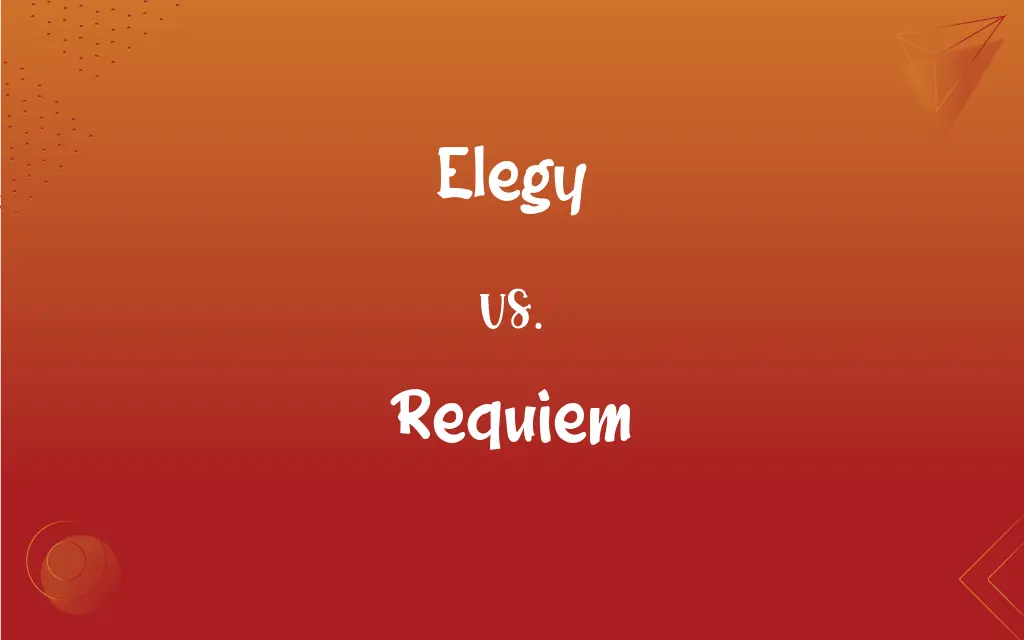Elegy vs. Requiem: What's the Difference?
By Aimie Carlson & Janet White || Updated on May 22, 2024
An elegy is a mournful poem reflecting on death or loss, while a requiem is a musical composition or mass for the dead.

Key Differences
An elegy is a type of poem that expresses sorrow and lamentation, often for someone who has died. It typically features reflective and melancholic tones, exploring themes of loss, mourning, and sometimes consolation. On the other hand, a requiem is a mass or musical composition created specifically for the repose of the souls of the dead. Requiems are traditionally part of the Roman Catholic liturgy but can also be standalone musical works.
Elegies are literary works that can take various forms, such as elegiac couplets in classical poetry or more freeform styles in modern poetry. They often reflect personal grief and universal themes of mortality. Requiems, in contrast, are usually grander in scope, involving choral and orchestral arrangements designed to be performed during funerary rites or memorial services.
While an elegy is a poem that can be written by anyone and for any deceased person, a requiem is a formal, often commissioned musical piece meant for public or religious ceremonies. Famous examples of elegies include Thomas Gray's "Elegy Written in a Country Churchyard," while notable requiems include Mozart's "Requiem Mass in D minor" and Verdi's "Requiem."
Elegies are primarily textual and read as literary expressions of grief. They often provide a space for personal reflection and commemoration. Requiems, on the other hand, are experienced as auditory events, meant to provide solace and a sense of communal mourning through music.
The emotional tone of an elegy is introspective and contemplative, focusing on the poet's personal sorrow and meditations on death. Requiems convey a broader sense of mourning, aiming to honor the deceased and offer comfort to the living through the powerful medium of music.
ADVERTISEMENT
Comparison Chart
Definition
Mournful poem reflecting on death or loss
Musical composition or mass for the dead
Form
Poetic, textual
Musical, often choral and orchestral
Usage
Personal reflection and commemoration
Public or religious ceremonies
Emotional Tone
Introspective, contemplative
Broad, communal mourning
Notable Examples
"Elegy Written in a Country Churchyard" by Thomas Gray
"Requiem Mass in D minor" by Mozart, "Requiem" by Verdi
ADVERTISEMENT
Elegy and Requiem Definitions
Elegy
A reflective and sorrowful poem.
The poet's elegy captured the sorrow of losing a friend.
Requiem
A solemn piece of music honoring the deceased.
The orchestra played a requiem to honor those who had passed.
Elegy
A literary work in verse mourning the deceased.
The elegy was recited at the memorial service.
Requiem
A choral and orchestral work for funerary rites.
The requiem was both beautiful and deeply moving.
Elegy
A meditative poem on death and loss.
The elegy provided a poignant reflection on life's transience.
Requiem
A mass for the repose of the souls of the dead.
The choir performed a requiem during the funeral.
Elegy
A mournful poem lamenting the dead.
She wrote an elegy for her late grandmother.
Requiem
A musical composition for memorial services.
Mozart's Requiem is one of his most famous works.
Elegy
A poem expressing lamentation for loss.
His elegy conveyed deep emotions of grief and remembrance.
Requiem
A mass for a deceased person.
Elegy
A poem composed in elegiac couplets.
Requiem
A musical composition for such a mass.
Elegy
A poem or song composed especially as a lament for a deceased person.
Requiem
A hymn, composition, or service for the dead.
Elegy
Something resembling such a poem or song.
Requiem
A mass (especially Catholic) to honor and remember a dead person.
Elegy
(Music) A composition that is melancholy or pensive in tone.
Requiem
A musical composition for such a mass.
Elegy
A mournful or plaintive poem; a funeral song; a poem of lamentation.
Requiem
A piece of music composed to honor a dead person.
Elegy
(music) A composition of mournful character.
Requiem
(obsolete) Rest; peace.
Elegy
A classical poem written in elegiac meter
Requiem
A large or dangerous shark, specifically, (zoology) a member of the family Carcharhinidae.
Elegy
A mournful or plaintive poem; a funereal song; a poem of lamentation.
Requiem
A mass said or sung for the repose of a departed soul.
We should profane the service of the deadTo sing a requiem and such rest to herAs to peace-parted souls.
Elegy
A mournful poem; a lament for the dead
Requiem
Any grand musical composition, performed in honor of a deceased person.
Requiem
Rest; quiet; peace.
Else had I an eternal requiem kept,And in the arms of peace forever slept.
Requiem
A song or hymn of mourning composed or performed as a memorial to a dead person
Requiem
A musical setting for a Mass celebrating the dead
Requiem
A Mass celebrated for the dead
Requiem
A musical tribute to the dead.
The community gathered to listen to the requiem in memory of the victims.
FAQs
Can a requiem be part of a religious service?
Yes, requiems are often part of Roman Catholic liturgy and other religious services.
Can an elegy be read at a funeral?
Yes, elegies are often read at funerals and memorial services.
What is a requiem?
A requiem is a musical composition or mass for the dead.
What is the tone of an elegy?
The tone of an elegy is introspective and contemplative.
Can a requiem be performed outside of a religious context?
Yes, requiems can be performed in concert halls and other venues as musical tributes.
Are elegies only about death?
While they often focus on death, elegies can also reflect on any form of loss.
Are requiems always musical?
Yes, requiems are musical compositions, often involving choir and orchestra.
What is the tone of a requiem?
The tone of a requiem is solemn and intended for communal mourning.
What themes do elegies explore?
Elegies explore themes of death, loss, mourning, and sometimes consolation.
What is an elegy?
An elegy is a mournful poem reflecting on death or loss.
Who can write an elegy?
Anyone can write an elegy as a personal reflection on grief and loss.
What are some famous requiems?
Mozart's "Requiem Mass in D minor" and Verdi's "Requiem" are notable examples.
What instruments are used in a requiem?
Requiems often use orchestral instruments, including strings, brass, woodwinds, and percussion.
How are elegies and requiems similar?
Both elegies and requiems deal with themes of death and mourning, offering expressions of grief and remembrance.
Is an elegy always in poetic form?
Yes, elegies are a form of poetry.
What is the primary purpose of a requiem?
The primary purpose of a requiem is to honor the dead and provide solace to the living.
Are elegies always sad?
While elegies are typically mournful, they can also include elements of reflection and hope.
Do requiems have lyrics?
Yes, requiems often include choral lyrics, usually in Latin, as part of the mass.
Can an elegy be uplifting?
Some elegies offer a sense of consolation and remembrance, which can be uplifting.
What are some famous elegies?
"Elegy Written in a Country Churchyard" by Thomas Gray is a famous example.
About Author
Written by
Aimie CarlsonAimie Carlson, holding a master's degree in English literature, is a fervent English language enthusiast. She lends her writing talents to Difference Wiki, a prominent website that specializes in comparisons, offering readers insightful analyses that both captivate and inform.
Co-written by
Janet WhiteJanet White has been an esteemed writer and blogger for Difference Wiki. Holding a Master's degree in Science and Medical Journalism from the prestigious Boston University, she has consistently demonstrated her expertise and passion for her field. When she's not immersed in her work, Janet relishes her time exercising, delving into a good book, and cherishing moments with friends and family.































































